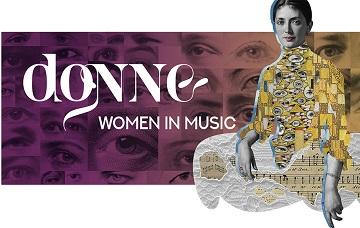Confronting canonicity and promoting diversity: Gender and contemporary concert programming
Applications are invited for an Open-Oxford-Cambridge AHRC DTP-funded Collaborative Doctoral Award at The Open University in partnership with the Donne Foundation. This fully-funded studentship is available from October 2022 on a full or part-time basis. Further details about the value of an Open-Oxford-Cambridge AHRC DTP award are available on our Studentships page.
Closing date: midday (UK time) 11 January 2022
Project overview

Working with the Donne Foundation, this Collaborative Doctoral Award seeks to create an evidence base on gender disparity within contemporary classical-music concert programming with the aim of realising effective strategies and pathways for the programming of diverse women composers within international orchestral and ensemble concerts. The research will produce three case studies based on orchestras and ensembles within Donne’s network of ambassadors (https://donne-uk.org/ambassadors/) that will investigate good practice in meeting 50/50 gender splits and diversity within their concert programming. The project aims to challenge the gender inequality of classical-music concert programming and investigate the frequent tokenism and convenience programming (where the same few women appear in concert programmes), which is leading to the canonisation of a handful of women composers that ignores the vast collection of women’s music that exists beyond the few in circulation. Statistics from the 2020/21 concert series, analysed by Donne, found that works by women were included in only 11.45% of concerts performed worldwide and, of the 14,747 individual compositions programmed, only 1.11% were by Black and ethnic minority women. Investigating the pathways for programming diverse women composers in ensemble and orchestral concerts is urgent for overcoming the great gender disparity which exists in concert programming worldwide. Capturing this learning is a key step in understanding the barriers to programming as well as educating the arts and entertainment industries to adopt more inclusive practices.
This CDA has the potential for significant impact in providing a framework for other organisations looking to improve their gender balance in concert programming. The research will play an important part in changing the tide on programming practices that are out of step, stuck in old patterns, and non-inclusive of diverse voices.
The candidate will have full access to Donne’s Big List Database, receive bespoke training from Donne on how to access, add, and update the Big List collection, and will have access to a network of ensembles and orchestras directly accessing the database for programming needs. The project will provide an invaluable insight into how concert programming operates and will observe and input into Donne’s advisory panel team, which assists in the programming of women’s music. The successful candidate will also have opportunities to contribute to outreach programmes that draw on database content to deepen the public’s understanding of marginalised figures and will be encouraged to share their research at panels and industry talks. The PhD candidate will use their research to create social media ads and campaigns highlighting why women have been left out of historical accounts of music making, as part of Donne’s educational stream. The research will provide an opportunity to engage directly with internationally recognised ensembles and orchestras who use the database for radio broadcasts, education, data accuracy, and playlist creation with the assistance of Donne.
Supervision
The CDA is jointly supervised by Drs Laura Hamer and Manuella Blackburn at The Open University. Dr Hamer has published widely on women in music. Her recent books include Female Composers, Conductors, Performer: Musiciennes of Interwar France, 1919-1939 (Routledge 2018, paperback 2020) and The Cambridge Companion to Women in Music since 1900 (ed. CUP, 2021). She is currently co-editing The Routledge Companion to Women’s Musical Leadership: The Nineteenth Century and Beyond and PI of the AHRC-funded Women’s Musical Leadership Online Network. Dr Blackburn is a multi-award-winning electroacoustic composer and champion of diversity in music programming. She is currently one of UKRI’s 10 funded ED&I Engagement fellows and her research is focused on the representation of cultural diversity within online music platforms.
The student will also be supervised by Gabriella Di Laccio, founder, and curator of Donne, who is a leading activist for gender equality within the classical music industry, one of the BBC’s 100 most inspirational and influential women in the world in November 2018 and a sought-after professional soprano.
How to apply
We invite applications from candidates from all backgrounds and ethnicities. The successful applicant will have a good first degree in Music or a closely related subject, with an interest in social and cultural concerns, women composers, and inclusive practices. A good working knowledge of classical music is essential. Experience working with databases is desirable, but the project will provide training and guidance in this area. Applicants should meet the eligibility criteria for Open-Oxford-Cambridge AHRC studentships.
Please visit the OU pages about ‘Research Degrees in Music’ for guidance on how to apply for a PhD. The Faculty’s FAQs page may also be useful. Potential applicants are also encouraged to contact Drs Laura Hamer (laura.hamer@open.ac.uk) and Manuella Blackburn (manuella.blackburn@open.ac.uk) with questions and for any guidance before submitting their application.
You should apply to the PhD in Music by midday (UK time) 11 January 2022, indicate your interest in being considered for an Open-Oxford-Cambridge AHRC DTP studentship and submit a completed copy of the OOC DTP Application Form at the same time. Further details on how to apply for OOC DTP studentship funding is available on our How to Apply page.


